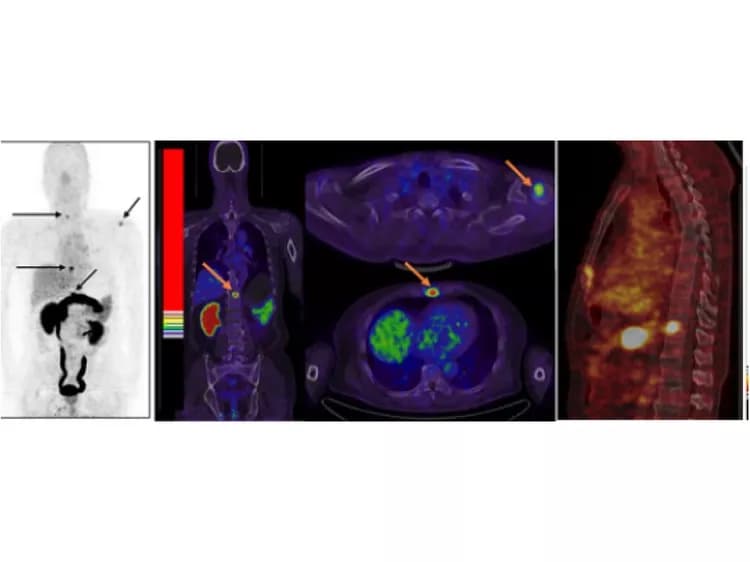
New Type Of PET Imaging Identifies Primary And Metastatic Prostate Cancer
In the featured article from the February 2017 issue of the Journal of Nuclear Medicine, researchers document the first-in-human application of a new imaging agent to help find prostate cancer in both early and advanced stages and plan treatment. The study indicates that the new agent -- a PET radiotracer -- is both safe and effective.
The new agent is a gallium-68 (Ga-68)-labeled peptide BBN-RGD agent that targets both gastrin-releasing peptide receptor (GRPR) and integrin ?v?3. Dual-receptor targeting provides advantages over single-receptor targeting by allowing tumor contrast when either or both receptor types are expressed, improving binding affinity and increasing the number of effective receptors.
Approximately one in seven men will be diagnosed with prostate cancer in his lifetime. In 2017, the American Cancer Society estimates that there will be more than 161,000 new prostate cancer cases in the United States and around 27,000 deaths from the disease. "Although treatable at the early stage, prostate cancer is prone to metastasis," explain the team of authors, led by Xiaoyuan Chen, senior investigator, Laboratory of Molecular Imaging and Nanomedicine at the U.S. National Institute of Biomedical Imaging and Bioengineering. "An effective and specific imaging method of detecting both primary and metastatic lesions is thus of critical importance to manage patients with prostate cancer."
This study included 13 patients with prostate cancer (four newly diagnosed and nine post-therapy) and five healthy volunteers. Ga-68-BBN-RGD PET/CT detected 20 bone lesions in seven patients either with primary prostate cancer or after radical prostatectomy. The patients with bone metastases did not necessarily have an elevated prostate specific antigen level. "This result is better than bone scanning with MDP," Chen notes, referring to the most common radiotracer used today. "MDP bone scans are sensitive but lack specificity because localized skeletal accumulation of Tc-99m-MDP can also be observed in the case of trauma and infection." No adverse side effects were found during the whole procedure and two-week follow-up, demonstrating the safety of Ga-68-BBN-RGD.
"Compounds capable of targeting more than one biomarker have the ability of binding to both early and metastatic stages of prostate cancer, creating the possibility for a more prompt and accurate diagnostic profile for both primary and the metastatic tumors," explains Chen.
Looking ahead, Chen says, "Ga-68-BBN-RGD could play an additive role in staging and detecting prostate cancer and provide guidance for internal radiation therapy using the same peptide labeled with therapeutic radionuclides." He points out that larger-scale clinical investigations are warranted.
Authors of the article "Clinical translation of a dual integrin ?v?3 and GRPR targeting PET radiotracer 68Ga-BBN-RGD" include Jingjing Zhang, Fang Li, Shaobo Yan, Li Huo, Libo Chen, Xinrong Fan, Weigang Yan, Zhiyuan Li and Zhaohui Zhu, Peking Union Medical College Hospital, Chinese Academy of Medical Sciences and Peking Union Medical College, Beijing, China; Gang Niu, Lixin Lang, Xuefeng Yan, and Xiaoyuan Chen, National Institute of Biomedical Imaging and Bioengineering (NIBIB), National Institutes of Health, Bethesda, Maryland.
Materials provided by Society of Nuclear Medicine. Note: Content may be edited for style and length.
Disclaimer: DoveMed is not responsible for the accuracy of the adapted version of news releases posted to DoveMed by contributing universities and institutions.
Primary Resource:
Zhang, J., Niu, G., Lang, L., Li, F., Fan, X., Yan, X., ... & Li, Z. (2016). Clinical translation of a dual integrin αvβ3 and GRPR targeting PET radiotracer 68Ga-NOTA-BBN-RGD. Journal of Nuclear Medicine, jnumed-116. DOI: 10.2967/jnumed.116.177048
Related Articles
Test Your Knowledge
Asked by users
Related Centers
Related Specialties
Related Physicians
Related Procedures
Related Resources
Join DoveHubs
and connect with fellow professionals

0 Comments
Please log in to post a comment.